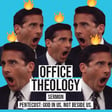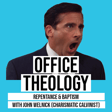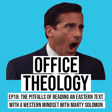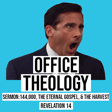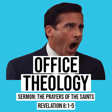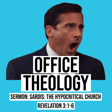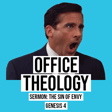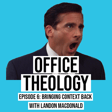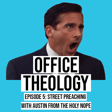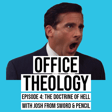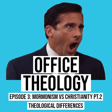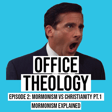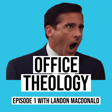Become a Creator today!Start creating today - Share your story with the world!
Start for free
00:00:00
00:00:01

Episode 7: Pt. 1 - End Times & Revelation with Chris Palmer
In this conversation, Chris Palmer, the dean of Theos U & Theos Seminary, tackles a handful of Revelation & End Times topics. This is part 1 of 2.
He walks us through:
- Rapture Theology
- The three main views of eschatology
- How to read/approach the Book of Revelation
- Much more.
Make sure to follow Chris Palmer on all things social media, and if you haven't checked out TheosU, head to https://www.theosu.ca to start a free trial!
Transcript
Understanding the Rapture
00:00:00
Speaker
Somebody who's a rapturist who believes that would suggest that this is referring to a snatching away where there's a disappearance of Christians prior to a seven year period of tribulation. Now, where did that idea come from? If you look at the first, I would say up until the 19th century, it's argued
00:00:29
Speaker
that this idea didn't really exist in any organized form.
Introduction to Chris Palmer
00:00:34
Speaker
Hey, well, welcome to the Office Theology Podcast. I have special guest, Chris Palmer, and we are tackling the hot take of end times and revelation. But I should say, Chris is tackling it, and I'm just here to listen and here to watch. So Chris, he's the Dean of Theos U and Theos Seminary, international teacher, Greek scholar, professor of theology, and an author as well. And you're working on your PhD, is that correct?
00:00:59
Speaker
Yeah, I'm about six months out from it. It's been a six-year project and the University of Wales and we are On our way to being done. So happy about that six. It's been a six-year process and you're six months out That's about yeah, that's great. It's so I see the light at the end of the title and it's not a train. Hopefully so yeah, and what is it in?
00:01:21
Speaker
It's a PhD in philosophy and religion, and my thesis is an exploration of theodicy and suffering in the book of Revelation. So I've had to deal with a lot of source material from Revelation, kind of getting at it a different way, but it's been a philosophical and theological journey. I'm happy for it to be done.
00:01:41
Speaker
Nice. Yeah, well, tell us a little more about you if you want. Like, just let us in the life of Chris a little bit. Cool, man. Well, I love your page. I love Office Theology. It always makes me laugh. It's in the meme world we come from. It's good to have an ally like yourself.
00:01:58
Speaker
Theosu memes are fans of you, so we're in good company. Do you want to know a funny story real quick about Theosu memes? Yes. So 11 months ago, I responded to a Theosu memes when my account had like 300 followers. And I don't know who it was, but someone messaged me back saying, the office meme page is never funny and we'll never make it.
00:02:26
Speaker
Someone straight up roasted me and I'm like, okay, number one is an accident. That was my personal page and whatever, but it was just really funny. And here you are. Here I am. Yeah, we are allies in the meme world now. The meme page is wrong once in a blue moon, I suppose.
00:02:46
Speaker
Suppose just don't throw me in jail for it. No, you get a pass for this. You get a pass Okay, good. Tell us more about you from Michigan moved to California a year two years ago and then was with the OSU started building the school in the seminary that we now have and We move ourselves to Franklin, Tennessee. So I'm joining today from Franklin Yeah, I have been teaching at the professor level for almost five years and
00:03:16
Speaker
Yeah, I love theology. It's great to have conversations anytime we talk about the book of Revelation.
00:03:23
Speaker
Hmm. Absolutely. Yeah. Well, thank you for being here. Super appreciative of it. And this would be a good time for people listening. Uh, in the next couple of weeks, we're going to be doing a three month, like, uh, it's a gift card for three months subscription to TheosU that we're going to do a giveaway with. So make sure you look out for that. And so you can hear all of the wonderful teaching that Chris talks about. Okay.
00:03:50
Speaker
So we're going to hop into the topic.
Millennial Views in Christian Eschatology
00:03:53
Speaker
Probably about a month and a half ago now, I did a hot take on end times and revelation. And this is how it panned out after I shared with you about several thousand responses. But before we jump into the polls, we need to do some definition work. So what is the great tribulation?
00:04:11
Speaker
So it depends who you ask what the Great Tribulation is. I think maybe the first question we want to establish is millennial views. The way that I say in our class that they wish you is that how people think about the millennium is the way point for people to begin thinking about the Lord's return. And for that reason, Revelation chapter 20, verses 1 to 5, there's mention of a thousand year period
00:04:39
Speaker
people that, so there's different ways of thinking about this that have emerged throughout the millennia of church history. What do you do with that thousand year period? A position called the historic pre-mill position will say that that's a literal thousand years and Jesus comes back and returns at the beginning of that one thousand years and rules bodily on the earth for a thousand years. Then there is a position called amil and some people typically say that
00:05:08
Speaker
It means that they don't believe there's really a millennium, but it's probably not true to form. They would say that the thousand years is not a literal thousand years, and it's the church period or the time of the church that began with the second advent of Christ and continues until Christ returns. And when Christ returns, we go into the new heaven and the new earth. In both of those positions, presume that there's going to be times of suffering.
00:05:38
Speaker
Those positions would look at possibly the potentiality of an increased time of suffering that's going to take place before Christ comes back. And then there's a post-mill position where they look at and say, hey, you know what, we're kind of like the on-mill position, but we also believe that things are actually going to get better before Jesus returns. And then you have where that language is distracted for the most part is a position called pre-tribulation, pre-millennialism. I think it's confusing.
00:06:07
Speaker
And these individuals believe that there's a second return of Christ, well, typically a third, but there's a catching away of the church that takes place before a seven-year period.
Pre-Tribulation and Rapture Origins
00:06:23
Speaker
And after that seven-year period, Christ returns bodily, and then there's a thousand-year period, and then Satan's loose, and there's the new heavens and the new earth. So depending on who you ask,
00:06:36
Speaker
The great tribulation usually these days is used by pre-tribulation, pre-millenials to refer to the last three and a half years of that seven years tribulation. So which a pre-tribulationist individual doesn't believe that they'll be here during that time.
00:06:54
Speaker
Um, so that, that would be the great tribulation in dispensational terms. That makes sense. Yeah. And so those are usually the cross hairs of theosseum memes, the dispensationalist, right? Yeah. They get caught in the cross fires. They, they, they absolutely do. Um, yeah. So they, they, they certainly are, are pushed to push the limits. And I don't think it's because we don't, we don't like dispensationalists per se. I just think that, you know, we like to pick on theology that sort of.
00:07:21
Speaker
is winning the day. Theological positions, people really haven't thought about, like, why do I hold this eschatological position? And they're not doing it in spite of anyone. It's just what they grew up hearing, what they taught. It stands to reason that all of us have inherited our theology. If we haven't thought about it, we have two options, Brennan. We've either thought about our theology or we've inherited our theology. It doesn't mean that all inherited theology is bad.
00:07:47
Speaker
But even if we've inherited it, it serves as well to think about it. And we may, in thinking about it, have to adjust our positions. And that doesn't mean we're deconstructing. It doesn't mean that we're walking away from Christ. It doesn't mean that we're part of some great falling away, or we're being rebellious. It just means that theology is a conversation that we never try to put a period on it. Because there's always more to say, and there's always ways to say it differently.
00:08:14
Speaker
So that's, yeah, well said. And I think what we're going to, I'm going to learn probably specifically is from this conversation. Every simple question is probably a little more intricate than I am realizing with that. So that all came from what is the great tribulation. And so there's a question. It was probably a question you got. Yeah. Yeah, exactly. Okay. So that's, that's helpful that, that, um, that helps bring some, some context to it.
00:08:41
Speaker
Where does the term rapture come from? And this question raptures in quotes, just to clarify. So in 1 Thessalonians chapter 4, there's the use of this word in the Greek, harpad, so it means to catch away or take out of. And it's referring to what happens at the moment of Christ's return.
00:09:05
Speaker
The three millennial views, which are Postmill, Historic Premill, and Amill, would say that this language is referring to a time where Christ comes back, and it's using language from Daniel chapter 7, various places of the Old Testament, to describe descriptively how it's going to be when saints go meet the Lord at His return.
00:09:36
Speaker
So they don't look at it necessarily as a snatch in a way, a secret snatch in a way of the Lord. They look at it as a descriptive language, creative language that's being used to express the joy and elation and what the experience is going to be like when Jesus returns and He comes back for His people.
00:09:56
Speaker
Somebody who's a rapturist who would suggest that this is referring to a snatching away, where there's a disappearance of Christians prior to a seven-year period of tribulation. Now, where did that idea come from? If you look at the first
00:10:18
Speaker
I would say up until the 19th century, it's argued that this idea didn't really exist in any organized form. Now the scholars, they're legitimate dispensational. We call these, I'll refer these individuals as dispensationalists, and we won't get into that right now. Why? These dispensationalists would say,
00:10:39
Speaker
Well, people believed this before that. I've read their works and their cases. It's really hard to make a case that anybody was believing prior to the 19th century that there's going to be a snatching away.
00:10:52
Speaker
There was a figure by the name of John Nelson Darby, and he's sort of become popular in theological circles to talk about this guy, who emerged out of an early night meeting in the UK, where he began to report this idea of a second secret snatching away. This became popularized by a gentleman named C. I. Schofield, who wrote what is called the Schofield Bible, where he took Darby's system, that included
00:11:21
Speaker
excuse me, a pre-tribulation rapture and made it very popular within the footnotes of this Bible. Now this Bible sold into the millions and was very popular among evangelicals. Fundamentalism was emerging at that time as a counter to what's the word, Darwinism. And so the fundamentalists really took the Darby system and it became very popular and then the Pentecostals kind of latched onto it for all the reasons.
00:11:51
Speaker
And before you knew it, the Arbeism and this idea of a second rapture was becoming very popular. And I think that's kind of where we find eschatology today.
Impact of 'Left Behind' and Cultural Influences
00:12:02
Speaker
Yeah. And this in, um, after Darby and kind of all that, that's when the series left behind kind of became popular. Yeah. So yeah, eventually, um, Darby was in the 19th, it was in the early 20th century, even before that, but the Scofield's Bible comes out in the early 20th century. And then, then in the seventies.
00:12:22
Speaker
how Lindsay, the late great planet Earth, sold 30 million copies, and then that was an influence for the Left Behind series, which ended up selling, I think, present day, 80 million copies. And so a lot of people, the only thing they've ever known eschatologically is this. But when you look back,
00:12:40
Speaker
in the 16th century when Michelangelo's painting, and he's putting up the Lord's Return. I mean, it doesn't seem very violent. It seems they look at the painting and the frescoes that he has on the Sistine Chapel of the Lord's Return. It doesn't look like the conspiratorial
00:13:00
Speaker
Lord's return that we have today where there's a secret snatching away, you just don't see that. So history of interpretation is very important when it comes to eschatology and the way that things were being interpreted, we know from artists and from culture, from popular readings at that time, really didn't have this idea of a pre-tribulation rapture.
00:13:19
Speaker
Hmm. That's interesting. It's, it's funny because I feel like a lot of people on my page will reference left behind and like how it scared them and different stuff like that. But I, I don't know if you know, but I grew up like hardcore LDS, like Mormon. And so, um, that I had my own, own issues to deal with growing up that way, but left behind was not one of them. Cause I'm like, sure. And I, I try to watch him like, this is ridiculous. Yeah. I, I couldn't do it.
00:13:49
Speaker
But that's helpful. Okay. It's very popular in a lot of people. That's just what they were given and that's what they know and they assume. But the encouraging thing is that it's a very late reading of eschatology. It's very new, relatively speaking. And there's other ways of thinking about it that have been around much longer.
00:14:16
Speaker
Yeah, and I heard you kind of alluded to it. A lot of people have either been handed down their theology or they've thought about their theology. And what I'm learning just even from these poll numbers that I'll share in a little bit is a lot of people, their view on the end times have been handed down to them. They haven't put a lot of thought into it because I think the conversation of end times or even the book of Revelation can seem really, really intimidating. So they're like, I'm not sure what to do with this.
00:14:43
Speaker
And this person seems like they've done the most research. Sure. I'll just kind of adopt that. But I've also noticed a lot of people hold it pretty loosely, at least that I've talked to. Like it's, I'm not really sure. I kind of, because it's probably a younger generation, I deal with that has just kind of not written off. That's the wrong way to put it, but, um, they're not really holding it with a close fist. Does that make sense? Yeah. So you're talking about the resketology. Yes.
00:15:11
Speaker
There's always the proverbial apology from pastors when they go to preach the book of Revelation because they know that people are hesitant towards talking about it, owing to how it's been very conspiratorial in the last 150 years.
00:15:31
Speaker
And pastors today of healthy congregations don't really want to be involved in anything conspiratorial. They don't want to wear their people out. They know where their people are at. And anything they preach, they want it to be encouraging. They want it to be uplifting. They want it to be something that can sustain their lives and help build faithful communities of people who follow Jesus. And trying to follow
00:15:52
Speaker
in the Left Behind series as they run through the deserts and they use satellites to track down the anti-crisis, anything but that, and so they make apologies for it. The good news is that
00:16:07
Speaker
People are moving away from this attitude that evangelicals, even Pentecostals, have had towards the Book of Revelation, specifically in North America, for the longest time.
Revisiting Revelation in Modern Times
00:16:18
Speaker
And I would say that there is a renaissance of the Book of Revelation that is taking place, and it's happening inside of scholarly circles first.
00:16:28
Speaker
And it's moving its way into pastors and pulpits of churches, and I can start seeing evidence for that. And so I think it's helpful to rethink how we've been thinking about the book of Revelation.
00:16:41
Speaker
Oh, for sure. And I think that's what's exciting too is I've been studying and diving deep as well because the church I'm a pastor at, we're kicking off starting January 14th, going through the book of Revelation. And I've been talking with our lead pastor quite a bit and just kind of like wrestling through
00:17:01
Speaker
all that this is because he grew up like true, like AG, Assemblies of God, kind of in that circle. And I haven't really heard much. I mean, learned much about it beyond just reading through like Bible plans. But yeah, we're excited to go through it and kind of help
00:17:19
Speaker
our people um think about it differently and it's crazy how many people after we announce they're like I might not come to church for those several months that we're going through it because they're nervous about it yeah they're very nervous yeah and and rightfully so I mean I'm not saying that they shouldn't come to church but I understand their hesitations nothing has really been I mean when we think of book revelation with there's this scary fantastic imagery in it but we we just you know we we did we just did a town hall
00:17:49
Speaker
at the OCU and My way into revelation is when I did I in my thesis work That I worked on for six years. Yeah, my largest chapter my fourth chapter is a Excuse me, I'm getting over a cold here And I'm at the I'm at the itchy throat cough stage. Yep perfect for interviews Perfect for interviews. It's our last town hall. We've cough so much. We're gonna make a montage out of it, but
00:18:19
Speaker
The reading that I did engages the text. My fourth chapter is about a 150-page commentary on the book of Revelation from 1 to chapter 22. And what I really love about it is that it's just a narrative reading of the text. And a narrative reading means that it's dealing specifically with what's there in the text and what's not there in the text.
00:18:46
Speaker
It gave me the opportunity to kind of put aside the categories for a second and not have to decide, do I want to come at this as a pre-mill? Do I want to come at this as an on-mill? Where is the rapture at? Is the rapture not in here? And kind of start off on the foot that everybody gives to you and basically the method, we can talk about that another time, that I came at it with was like, let's just deal with what's in the text and what
00:19:15
Speaker
a hearer might hear as they read the text. And working through that was tremendously helpful. And one thing that began to emerge from this is, you know, revelation is not a chronology about how the world is going to end. Revelation is not a map about God's future dealings specifically with no scholar says that.
00:19:41
Speaker
scholars that are looking at it and understanding how apocalyptic emerged, particularly in the Second Temple period, a little bit before that, but it was really kind of a caught fire in this period of time, was owing to the people of God's suffering, as well as the expectation that God would vindicate that suffering, and seeing
00:20:05
Speaker
how the wicked was not necessarily how the wicked was sort of getting ahead and other people of God had to suffer.
Symbolism and Faithfulness in Revelation
00:20:13
Speaker
And how do you write
00:20:16
Speaker
two people that are suffering. How do you write to people that are being very faithful to God and experiencing loss and experiencing tragedy in a way that can encourage them that God was going to somehow vindicate their judgment without actually explaining how He's going to do it? And there was this—apocalyptic was a genre that would use symbolism to do that and to explain that, and that's—and a lot of it that we find in Revelation recalls
00:20:45
Speaker
what the Johannine community would be very familiar with, and that is imagery in words and language that comes from the Gospel of John, as well as imagery that comes from the Old Testament. And so when you start
00:21:01
Speaker
considering what the hearers would recall from those places in Scripture that the community in Revelation would have been familiar with, you start to get a picture of a text that was written to people to encourage them to see how their experience was, how God was being faithful to them in their experience of suffering, I should say.
00:21:26
Speaker
And that's very timeless to us. You know, I could show you kind of how that reads. I'll give you an example. I'd like to get into the text a little bit. Let's do it. Yeah, so basically, you go to Revelation, and I'm not, and look at the people that are listening, I'm not saying that this just has to be what you do, and take it or leave it, type thing. But just consider the possibility of what's going on in the text. It's kind of how we approach things as scholars.
00:21:57
Speaker
In Revelation chapter 2, Jesus is giving a prophetic message to seven churches, and he gets to this church in Smyrna, which is where present-day Izmir is at today. It's buried under that city, actually. It's one of the seven churches you can't actually see because it's under Izmir, so good luck trying to get to it. And it was a very faithful church, and Jesus tells them, you know, I know that you are, I know that you're poor, but you're rich.
00:22:26
Speaker
And then he says to them, and some of you, which in the Greek is the part of genitive, it doesn't mean all of them, but there's going to be some of them, which is kind of interesting, because it's not all of them, but there are some of them. Some of you are going to be thrown into prison by the devil for 10 days. And Christ encourages them to overcome. So you're like, wow, what do you do with that? And so my thing is, just kind of acknowledge that it's there.
00:22:55
Speaker
Shelve it for a while. Don't go ham with it. Just just just kind of don't try to read into it. Just just you you have this Language that they're gonna be thrown in the prison for 10 days. Mm-hmm Just hold it loosely for now and and just let more unfold itself without trying to be overly conclusive about that there. Yeah okay, so He's isn't gonna throw you in prison for 10 days. Yeah, but be faithful except Sarah actually, let me
00:23:25
Speaker
Pull it up the case. So while you're pulling it up, is that the problem of when people read it and they want to, I'm trying to say this carefully, like make more out of it than what's actually there? Like they're trying to make it overly symbolic and stuff like that? Yeah, I think, yeah, you know what it is? They just get ahead of themselves, I think sometimes. You know, they just get ahead of themselves.
00:23:51
Speaker
They're trying to be conclusive right there. And it's going to literal. It's not literal. And they're already talking about it. And they're no longer in the text anymore. And then they're talking about their favorite theologians and what the assistio says. And before you know it, they've gone outside of the text. Yeah. They're trying to decipher it, trying to draw applications to it. And we never really finished with it. So it says,
00:24:14
Speaker
Excuse me I know your tribulation your poverty and the slander of those who say that their Jews are not the synagogue of Satan Do not fear what you're about to suffer Behold the devil's about to throw some of you in prison that you may be tested for ten days You have tribulation be faithful unto death And I'll give you the crown of life. I mean that is a wonderful promise. Yeah
00:24:35
Speaker
So if you go through the text, you get into chapter four and five, you get into chapter three, which is more to suffering churches that are in revelation. Some of them are not so much suffering. You could argue that Laodicea and Cyrus aren't really suffering. Philadelphia is, but maybe they're not suffering because they're compromising to avoid suffering.
00:25:01
Speaker
So, then you get to chapter four and five. Ooh, that'll preach. There you go. That will preach. And then you get to chapter four and five, and there's the throne room. There's heaven. Yeah. Chapter six, you see the judgments, okay? So, you eventually get into the seals, you get into the bowl, you get into the trumpets, trumpets and the bowls. Okay, but there's this idea, this reoccurring theme of vindication that's taking place. And how is God answering the cries of the souls of the altar in Revelation, the fifth seal in Revelation, chapter six, nine to ten?
00:25:29
Speaker
And so, I mean, we could walk through it if we had time. If I was doing a class on it, we'd go through all these verses, but you start seeing how God is, how things are slowly working to vindicate those who are suffering, those who have been thrown in prison 10 days. Okay. So you get to this, you get to chapter 20. Okay. Let me pull it up. You get to Revelation chapter 20, and hopefully you haven't really forgotten anything. And, you know, in the title, in the ESV, it says, the thousand years.
00:26:00
Speaker
Yeah, if you haven't really brought your case, if you've kind of are willing to put your categories down for a second.
00:26:06
Speaker
Not like pre-mail Yeah, yeah, yeah, you know, well Augustine's pre-mail or Augustine's on mail and you know, the church did a keys for you Yeah, all that stuff. Okay, and well the church files are wrong and council of Ephesus and we're not in the text anymore Mind you that a jab at Gabe. I Think it was a jab at our conversation. We just had right
00:26:30
Speaker
Okay, so then you see this in verse one. Then I saw an angel coming down from heaven, holding in his hand the keys to the bottomless pit in a great chain. He sees a dragon, ancient serpent, who was the devil and bound him for a thousand years and threw him into a pit and sealed it over him. So he might not deceive the nations any longer, a thousand years, ending that he might be released. So let's stop for a second. What does this language sound like to you?
00:26:57
Speaker
Are you asking me? It does. Yeah, I mean, yeah, if you don't know the answer, I'll give it to you. But so then I saw an angel coming down from heaven holding in his hand the key to the bottomless pit in a great chain. And he sees the dragon who is the devil and Satan and bound him for a thousand years. Yeah. Does that sound like anything that we've encountered in the narrative yet? I'd say no. It sounds like maybe.
00:27:23
Speaker
It might remind you of the church in Smyrna who was thrown into prison. Oh, yeah. Yeah. Okay. See the connection there. I think you, it's possible you could argue. Yeah. Maybe. What's going on here?
00:27:40
Speaker
is that those who were thrown into prison for 10 days are seeing that the one who thrown them into prison is actually the one who threw them into prison is actually being thrown into the abyss, not for 10 days, but for a thousand years. Oh, okay.
00:27:57
Speaker
So what if that's the case and so when you start to line up the Greek in the language You see the word cast see the word throw very similar language. Yeah, you see the word prison You're not being thrown into prison. You're being something you throw into worse. You're being thrown into the abyss and then
00:28:13
Speaker
You know, it's not a thousand, it's not days, it's years. And ten is the lowest decimal of ten units that is being used in Revelation. A thousand is the highest. So I think what you actually could be showing here is that it would signal to the hearers that whatever the thousand years is referring to, whether it's a figurative or whether it's a literal thousand years,
00:28:39
Speaker
It's showing ultimate defeat of the enemy in vidication that is coming for those who are in Christ Jesus, those who have suffered innocently. So that is a really good way to preach it. Because that will preach. And you haven't gotten into it yet. Well, are you Amil? Well, are you pre-Mil? Or are you post-Mil? But what you are saying is that despite those categories, Jesus is going to bring justice. And Jesus sees.
00:29:09
Speaker
Everyone who has suffered innocently, Jesus sees those who have been faithful to him in spite of their sorrows and have gone through life and felt unseen. He sees them. Yeah, that's good. Yeah. Because thinking to the hearers of that church, what is about to happen to you or what's happened to you is going to happen to the one that's doing that to you. But finally, oh, in a great, in a greater way.
00:29:36
Speaker
Yeah, in a greater way, injustice will be serving Christ, will have the victory. And it's like when you get stuck in just the camp arguments, I feel like you miss the beauty of that. Like, I mean, at least the ones I've heard and watched and listened to, I'm like, you're right, a lot of people end up quoting, they'll use scripture to hop into their favorite theologian on their preferred stance.
00:30:02
Speaker
Yeah, and just the beauty of connecting those. Yeah, absolutely. I mean, I'm a text guy. I like to work in the text, but we don't have a lot of individuals in Bible school that go to Bible school, actually are taught to go into the text and actually become good readers of the text. And my thing is, you know, like we said, we start with these categories,
00:30:28
Speaker
And then we build out or we, you know, that's, that's where we begin. Anybody that's doesn't really fit our category, you know, all of those war with the pre-mills and, and on and on and on. Um, there's been say since don't want to hear it from anybody else. It's like, but we're not readers of the text. Yeah. Huh. That's good. That's, I appreciate that and ensuring that a lot. Um, a question I'm kind of looking at the, the show notes here. Um,
00:30:58
Speaker
And I want to ask you, what would you say to the Christian who wants to start studying Revelation? What are a few things you'd have to keep in mind while doing so? So first of all, you have to begin with understanding, number one, the apocalyptic genre. That's primo importance. If you don't get what the genre is doing,
00:31:26
Speaker
You can forget about it. I think that is so essential. Yeah. What is your apocalyptic literature or genre doing? Yeah. Okay. So, so for instance, we have gospel narrative, Matthew, Mark, Luke, and John. And it's a narrative and it's historic narrative in a sense that kind of is
00:31:47
Speaker
You could argue it's Greco-Roman biography, in a way. So you know what to expect. You have epistles. You understand the nature of an epistle. It's instructional. You know, in the Old Testament, you have Psalms. Okay, there's Psalms. You have Proverbs. They're pithy saints. When you get to the Book of Revelation,
00:32:10
Speaker
it is a genre that really came out of wisdom as well as prophetic. Because in the wisdom, you get taught, how do you live in suffering? Problems kind of deals with that. Ecclesiastes absolutely deals with that. Some of the Old Testament pseudepigrapha deals with that, which is other writings during the Old Testament time that didn't necessarily, that didn't make it into Scripture. Some of the apocrypha deals with that. Okay.
00:32:38
Speaker
And then you have the prophetic writings which declares the goodness of God and the faithfulness of God. And that kind of has like a love child, and it creates in the intertestamental period this
00:32:50
Speaker
hybrid genre, which is apocalyptic, which deals with the goodness of God in the face of suffering. And it's not necessarily trying to explain it, because it doesn't. But what it does is it tries to encourage you and exhort you to live faithfully to God in spite of the fact that suffering takes place. That's what it's doing. So when you read like the Apocalypse of Abraham, or when you read
00:33:12
Speaker
4th Ezra, which is part of 2nd Esdras, you will see the book of Enoch. I know everybody's on the book of Enoch, but that was not written by Enoch. I'm sorry to break it to you. You'll see how those themes are all in there. So Revelation is, if you look at 2nd Baruch, it's very similar. There are parts from those texts that are very similar to Revelation because it's dealing with the same themes.
00:33:41
Speaker
understanding that and how that works, a lot of it is using imagery to encourage people to live faithful unto Yahweh or unto God or when you have a Christian apocalypse, unto Christ. That's what it's going to do. It sets your expectations correctly and then it also tells you how it gets you there to make that and it's using
00:34:06
Speaker
apocalyptic imagery that would have communicated that to people, dragons, women, beasts, the sea, things that these individuals would know what it was about.
00:34:22
Speaker
Your expectations in reading those kind of brings you over the revelation like okay, this is what this is doing here Yes, this is what it's doing. It's not just out here trying to predict the end of the world It's it's trying to set the right gives you did you start on the right foot? So first things first have the proper filter of what you're about to read everything through and that's understanding what the literature is Understanding the genre is okay important. Perfect. Okay
00:34:48
Speaker
So from there, then say you understand that, okay, this is what it is. So then I would say the next thing you do is understand John, because we start with the premise that the Apostle John is the writer. So he's going to use language that's familiar to his community who has his gospel.
00:35:07
Speaker
And he's going to use language that's familiar to himself. So have a read of the Gospel of John. Spend time reading the Book of John because a lot of that imagery is going to appear, a lot of those words, a lot of that vocabulary from the Gospel of John.
00:35:24
Speaker
the language, the verbs, the nouns, okay, is gonna reappear in the book of Revelation. And so when you're trying to figure out what darkness, what would the hearers think about when they hear darkness? Well, how is darkness used in the book of John? How is the word cosmos used in the book of John? How is love used in the book of John? What do these things recall? And I think that kind of gives you a place to go. So when you're working through apocalyptic literature, you should be recalling
00:35:52
Speaker
book of John, you should be recalling places in the Old Testament where imagery is coming from. And then number three is to be familiar with Old Testament imagery, be familiar with the Old Testament scenes, because Revelation likes to think back to the Exodus, likes to think back to places in Daniel, likes to think back to places in Ezekiel, and it's kind of taking that language. But
00:36:18
Speaker
Biblical authors often would take language from the Old Testament or John or the Old Testament and kind of repurpose it Yeah, and do something different with that language To serve what it is. They're trying to say so don't be surprised when you see language in Revelation being Repurposed for another purpose and that that those are that's what? Apocalyptic does yeah Okay, so then as they're as they're going through
00:36:48
Speaker
Reading revelation, I think a lot of people, even according to the polls, so how their interpretation or leaning of revelation, literal or metaphorical? About 60% said metaphorical and 40% said literal. How would you wrestle with the tension of literal versus metaphorical in the apocalyptic literature?
00:37:14
Speaker
Yeah, so apocalyptic is, so the book of Revelation, apocalyptic is, more often times, is using imagery. I mean, how do you, you're gonna, a seven head, ten horned beast, and what are you gonna do with that? The people that are literal, they usually get stuck when it comes to those types of things, okay? The woman who flees out into the desert. I mean, these are hard to get around in literal. But the confusing part with Revelation becomes the fact that it really is, it's an apocalyptic.
00:37:42
Speaker
It's probably the genre, but it's it's even more of a monster. It's more Michael Gorman calls it a hybrid genre because it also is epistolatory. Apocalypses don't have, usually at the beginning of them, a message to seven churches.
00:37:57
Speaker
Yeah, yeah. And you don't see that in most of the apocalypse in the testamentary period. So you have this epistleatory element from it in the first three chapters. Yeah. Send these to the churches, pass it around, seven churches. And so
00:38:16
Speaker
I think you have to realize there are places in the text that are literal, the literal seven churches. But then again, I think literal also the seven churches functions in a way that it's, is it just convenient that there's seven churches or was there a literal historic seven churches? But seven there also represents the fact that it's for the message for the church universal.
00:38:38
Speaker
the way John writes, I allow for some leniency for that because John does use a lot of double entendre when you go through the text and you realize he means one thing and he also means another. It's not always.
00:38:50
Speaker
and or it can be both and or you know this or that it could be both so there are places to answer that I know this isn't probably very helpful there are places where it's certainly literal Jesus commanded John to write yeah the fact that there's a guy named Antipas in Pergamum who seems to have died well he doesn't seem to him that he's died is he real is he figurative I I don't know a scholar out there I've read I have read
00:39:20
Speaker
Every commentary in the book of Revelation, and since 1906, almost word for word. Everyone that matters. That's just the nature of writing a commentary. So there's really not much I'm not aware of in some of these things. I mean, I'm sure there's one or two I'm not aware of, okay? But I don't know of anyone that took that figuratively. And so I think you can take those literally. But then when you get to places where
00:39:49
Speaker
you know, you see the beast from the sea and the beast from the land. I don't think that's at all literal. I think that that's figurative, that's pointing at something. So when people say, well, the new heavens and the new earth, you know, the golden streets, I mean, here's another thing that's interesting to consider.
00:40:11
Speaker
Let's go to Revelation 11. I'll show you something that is just kind of a cool read. Because maybe the better question to ask is, how can I preach Revelation to my church in a way that is powerful? And you get Revelation 11, which is the dead center of the book.
00:40:36
Speaker
Revelation 12 is the turning point which is kind of like another it marks a major significant Structural change in it, but revelation 11 is very important. Yeah, it says in verse 1 that you have We'll just start, you know in verse 3 and it it says here I grant my authority my two witnesses and
00:40:57
Speaker
Now, people reading Revelation are going to want to know, who are the two witnesses? And the dispensationalists will always say, what's Enoch and Elijah? It has to be somebody who is caught up with God to come back because they come from heaven. Let's just put all that aside for a second. Yeah. Not go there because we really don't have that in the text, do we? Yep.
00:41:15
Speaker
It's not there. It's not telling us anything. So I don't know if the text, if the text doesn't give that to us, we're bringing it to the text and I don't like doing that. That's not how I work. Yeah. Methodologically. Okay. So 1000 through 60 days. Okay. We can get through all that, but look what, look what we see here is when they finished their testimony, excuse me, the beast rises from the bottomless pit to make one of them. He conquers them and he kills them.
00:41:45
Speaker
And their dead bodies lie in the street of the great city that symbolically is called Sodom in Egypt, where their Lord was crucified. Now this is a very interesting passage, because for the first time we see the Greek word platia, which is the word street.
00:42:05
Speaker
And it says that their bodies lay there. The Greek text indicates, first of all, according to Jewish law, you had to bury criminals. You can't just leave criminals laying out there. There's dignity, even a criminal's death. There's no dignity in the death of these two witnesses. These two witnesses are brutalized by the beast. Let's not even try to figure out who the beast is right now. Let's just figure that the beast just brutalized them.
00:42:35
Speaker
And then, um, where it says here that they were killed on the word here, kill the pocktail.
00:42:47
Speaker
Is a brutal death is a very brutal torturous death and there's no more than just casually kill them. It's like brutally brutalizing Yeah, this is describing a very brutal sadistic Yeah, this is definitely unjust a lot of way. Yeah, and I'm looking off camera cuz I'm reading I'm reading along. Yeah, please. Yeah, please okay, so In doing this like let's sit in in this for a second we think man Picture that for a second
00:43:16
Speaker
Just the imagery. Let's not even try to make it literal for you. They're just like, what's the imagery of people being killed and left on the street? No dignity. And these are servants of God. These are people that love the Lord and are doing exactly what God tells them to do.
00:43:37
Speaker
They're His messengers. They're His witnesses. And it's like it forms questions in your mind like this is the way that the people of God are treated. This is the way that God anoints them. He sends them. He empowers them. They have great ministry success in their obedience. And then they're killed, and then they're left on the street with no dignity. I mean, who does that sound like to you? Sounds like Jesus.
00:44:06
Speaker
Sound like the way Jesus suffered. Yeah. I mean, they gambled for His clothes, etc. Okay. So understanding that, we go to Revelation chapter 21. And... Let's see something here. Um...
00:44:39
Speaker
Let's see here. Yeah, so Revelation chapter 21. Let me just, my logos is being slow. OK, Revelation chapter 21. And we get verse number 21. And we have a description of the New Jerusalem.
00:45:08
Speaker
It says here And the 12 gates were 12 pearls each of the gates made of a single pearl and the street of the city Was pure gold like transparent glass. Hmm I Think about this for a second the last time The last time that we saw any mention Excuse me of the word street
00:45:33
Speaker
was in verse number 11, chapter 11, where the bodies were left on the street with no dignity left to die and left to rot for people to scoff at them. And yet the same individuals who have been faithful to God are now brought into the city of the New Jerusalem, where God has vindicated their suffering. And the hero discovers that the streets are made of gold, in a sense that seems to me that they may hear vindication.
00:46:04
Speaker
those who have suffered brutally on the streets now inherit streets that are made of gold, streets that welcome them into the kingdom and recompenses their unjust suffering. So I don't think it's going too far to say that the early church, the early readers may have been making these types of connections and been reading this way in a way that they say, man, God is really going to vindicate
00:46:29
Speaker
are suffering. And so this is consistent with a genre that's explained to people in story form why they should continue following Jesus and being faithful
Revelation's Core Message of Justice
00:46:40
Speaker
to Him. And see what we're not doing is speculating, we're not making this about the end times, we're just making this about a letter of a story about how to be faithful to Jesus. And so the applications for our life are not just one-dimensional, it becomes multidimensional. Yeah.
00:46:55
Speaker
Yeah, man, that's I love that because I think what you're doing is challenging the let's let's stop trying to figure out if something's literal or not literal and actually zoom out at what the What the point of the book is and I heard you say it several times so far in the conversation Revelation deals with the goodness of God in the midst of suffering like so this is meant to be
00:47:18
Speaker
and encouragement and an exhortation of like continue on no matter the amount of suffering and injustice you face as a faithful follower of Christ. It will be justified. It will be vindicated and he will have his justice at the end. Yeah and that's exactly precisely and that's exactly what apocalyptic literature seeks to do. It seeks to kind of cover those themes. That's why I'm saying again that's your expectation of revelation. That's I think you know you're starting off on the right foot.
00:47:48
Speaker
Yeah. And that's, I think that's going to be way less intimidating because I feel like even I feel like just probably recently in the past couple of months, revelations turned a corner for me as well, because I'm not like, I feel like going into, I have to figure out where I land on certain things because that's the biggest debate in the book of revelation.
00:48:07
Speaker
So rather than going in thinking like, I need to read this to figure out a stance, it's more like, hey, read it for how John intended it for the audience. And that's encouragement and the goodness of God in the midst of suffering.
00:48:20
Speaker
Yeah, I think that I think that's what it does, you know, and it takes the pressure off of you to have all these categories I mean look at I wrote 150 page commentary on it and it doesn't which is a small commentary to be honest, but It but it was informed by all kinds of scholarship and never once had to deal with What does Chris believe about the millennial reign? What is Chris yeah, I understand that
00:48:46
Speaker
you'd have to think to yourself at some point, when is Jesus coming? Because I'm not saying it's not important to answer that question.
00:48:53
Speaker
But I do think that millennial passage is a pretty obscure verse. And it's to me interesting that the creeds don't necessarily try to hash out historic people from Amel. He's coming back. He's coming back when he was. And it seems to me that the real focus of the letter is, how do we handle this? How do we be faithful?
00:49:23
Speaker
Because the real call is not to have it figured out when he comes back, but how do we be faithful? Not that it doesn't matter when he comes, but to be faithful until he comes. And that really is the message. I always tell pastors, hey look, Book of Revelation, up for grabs right now. For the longest time it's been read by
00:49:46
Speaker
dispensational, pre-millennialist, pre-tribulationist, I should say. And I think we need to rethink it. I mean, I was very disappointed, but not looking down on people, but disappointed to see during COVID and how there's this entire speculation and stuff. And that could move you one of two ways. You can have a real
00:50:10
Speaker
sour look about the book of Revelation, or you could say, hey, you know, it's time that we get this right, and I think we need to be gracious to each other. I just don't think that we need to be throwing each other in the bus when it comes to these things, and being a good reader of the text is important, and I would encourage anybody that's listening, you know,
00:50:29
Speaker
Instead of fooling around with the categories, making that your only endeavor, and reading books that try to decode things for you, it does serve you, if you're going to be serious about it, to get serious about learning coin in Greek, get serious about learning it to the point that you become familiar with how John writes.
00:50:50
Speaker
the vocabulary that John uses, the verbs that he uses, the participles that he uses, etc. And seeing how the Greek text in John kind of aligns with the Greek text in the book Revelation, and to see what is John doing with some of the elements, what is John doing with some of the language that he's using, because when you have that skill, your reading of Revelation is certainly to have more depth to it than just hashing out the categories of what the fathers say about that.
00:51:20
Speaker
Oh yeah. And I, I love that because I think it's like, here's the, the reading. And then once you're able to kind of understand and study that level of Greek, you're like, yeah, this, this, this hole goes deeper than I thought. This is a rabbit trial. It's way deeper than I thought. Um, that's good. Hey, so for the last few minutes, um, this flew by, hopefully there can be a part two sometime. Um, anytime. Yeah.
00:51:47
Speaker
Let's ask. So these are submitted questions from my followers that they were really concerned about, but we're going to like rapid fire them. Okay. Shoot them out. Why are boomers obsessed with the end times was the first one. The easy answer to that question is without throwing anybody into the bus boomers came up.
00:52:08
Speaker
in a time where they're inundated with end-time dispensational eschatology that was promoted by TBN, CBN, 700 Club, the Jim Bakers, what was this club called, PTL Club.
00:52:25
Speaker
And that was all the rage back then. They were the first ones to get their hands on the Great Planet Earth by Hal Lindsey, so the time formed them to think about it that way. A good study for you to do is get a copy of Late Great Planet Earth, which was written in 1970, when the Boomers were in their 20s. And read that and just see. And don't take that book lightly. That sold 30 million copies. And see how that formed them. That was how people were reading.
Historical and Political Influences on End Times
00:52:56
Speaker
Yeah. And that created, what that did was it politicized our readings of revelation. It made, uh, very conspiratorial, it connected government technology to, and, uh, government weapons to decoding the book of revelation. And it became turned into date setting. And so boomers were formed during that time. Yeah.
00:53:23
Speaker
That's basically it. It's a product of their environment and the teachers. Yeah, and you'll find out that those boomers that are obsessed with it are in North America pretty much. If you go to UK, you're not going to find many of them there, unless they've been influenced by North America. Preachers coming out of North America. USA, baby. All right. Why are end times talked about more around elections, politics, and world events?
00:53:49
Speaker
I mean, within the question is the answer, right? Within the question is the answer. I think because, as we were saying before, there is a conspiratorial agenda behind end times that for Jesus to return, there needs to be
00:54:13
Speaker
the rapture is going to... so the people that would subscribe to this, the pre-tribulational dispensationalists, would believe that the rapture of the church is going to occur before a period of seven... a tribulation period of seven years. In that tribulation period of seven years, they believe in something called the revised
00:54:33
Speaker
or they may say revived, Roman Empire, and they believe that Europe's going to have to reform itself under the revived Roman Empire. This is what they teach. Finish, get God's plan for man, get to take Bible, hear it all about it. So anytime they see any type of movement,
00:54:50
Speaker
war taking place in Israel, the presidents working with, it's not Israel, excuse me, Europe. They think that all of Europe is going to be reformed. They think that Russia's Gog and Magog is equal to 3738. And they think that there's a worldwide plan to reshape this. And elections usually have to do with the restructuring and reformation of government.
00:55:13
Speaker
And so I can say they become obsessed with that. And this is why elections usually create end times fervor. Wars create end times fervor because they see the reforming of Europe turn into the revive from an empire. And they're taught to believe that prior to that happening, there's a rapture. And so you can connect the dots.
00:55:33
Speaker
Yeah, especially now is the time that when we're recording this, it's there's a Hamas and Israel conflict and war going on. And so it's just I've left it even more. Yeah, I've left Israel out of this specifically because I don't want this to become a political podcast, but there's a lot that has to do with that. And I'll probably get banned for some reason for saying those words at this moment. Yeah, exactly. But there's there's a lot to this that would deal with that. We'll take that up another time.
00:56:00
Speaker
Okay, so last two questions. What is the mark of the beast?
00:56:07
Speaker
Or maybe there's only one question left for our time. Yeah, so I have a class that I deal with that at the OSU where I talk about that. So you have to deal with Revelation chapter 13, the beast coming up out of the sea, the beast coming up out of the water or the ocean.
Symbolism of the Mark of the Beast
00:56:26
Speaker
Excuse me, the sea, the beast coming up out of the land. I think the mark of the beast, quite simply,
00:56:32
Speaker
And I can explain to you how I arrive here, but it has to do with people whose lifestyle follows the beast. And I think the beast has a lot to do with a politicized system that serves people that promotes living contrary to Jesus. And so when people
00:57:01
Speaker
begin to live and order their lives in a way that is contrary to following Jesus, I think that they're following the beast. And I think the mark of the beast has to do with that, more so than a literal actual mark on people's skin or a microchip. I think it's a line in your lives in a way that shows that you're not
00:57:26
Speaker
being faithful to the Lamb because, contextually, everything in Revelation has to do with this faithfulness to Christ and this faithfulness to the Lord. And those that aren't that way line themselves up with the beast. You know, in Scripture, it shows how...so it has to be this, right? Those who are faithful to Jesus within Scripture have on them written
00:57:54
Speaker
Okay, the name of God. You see this. So you see how they receive a mark. The faithful in Christ receive a mark. I think that mark is their faithfulness.
00:58:10
Speaker
they're aligned, they're known by God. But I think that those that are unfaithful are known as those that have lined up with the beast. So I don't necessarily ascribe to people taking a literal mark or, you know, it's your credit cards or the vaccination or whatever it may be. Yeah, that's good. Man, I wish we could keep going.
00:58:32
Speaker
Um, but we'll have to, we'll have to a part two with this, but, uh, yeah, so I thank you so much for your time. Thank you for your insight and your knowledge. And once again, um, if you have not checked out theos, you go subscribe. It is probably cheap. It's 10 times cheaper than what you're probably paying for coffee on a monthly basis anyways. So, uh, make sure you go listen to all the excellent content there. Chris, thank you so much. Appreciate you.
00:59:00
Speaker
Thanks for having me, Brennan, and along with the office theology. That's right. We will, we will continue onward and making fun of everybody under the sun and no matter what camp you find yourself in. Um, yeah, so make sure you follow Chris on all things social media. And yeah, so thank you. Thank you so much.
